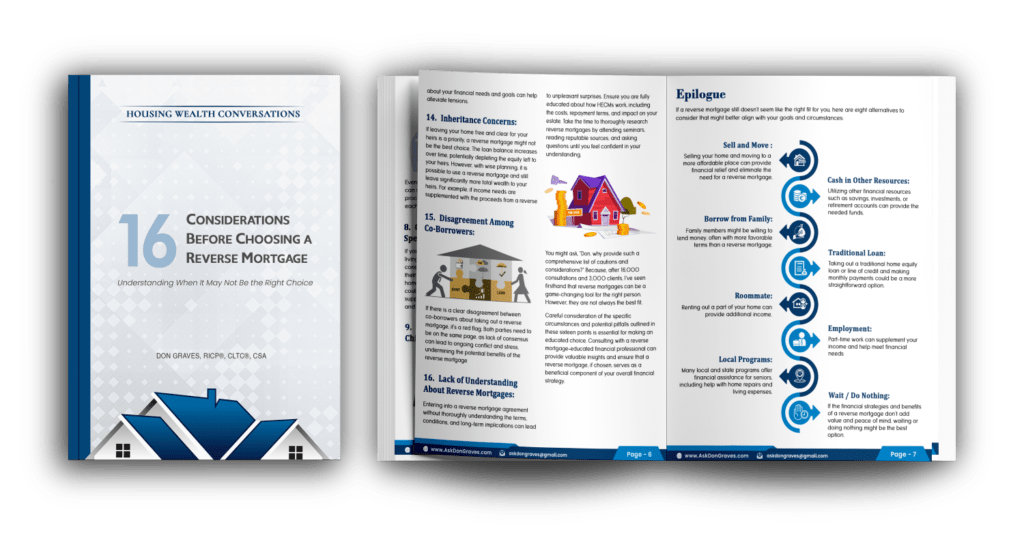Obtaining a reverse mortgage loan is a big decision! It’s normal for you and your family to have questions; and hopefully the answers below can help put your mind at ease.
A reverse mortgage is a loan that allows you to access a portion of your home equity and convert it into tax-free retirement funds. With this type of loan, you maintain the title to your home. The loan typically becomes due when the last borrower(s) permanently leave the home. Provided the home is sold to repay the loan, the borrower will never owe more than the appraised value of the home.
1. Do I have to be a certain age to be eligible for a reverse mortgage?
At least one borrower must be 62 or older. Proprietary reverse mortgages may allow for borrowers as young as 55.
2. Will I still retain ownership and title of my home?
Yes, you retain full ownership of your home, provided you meet loan conditions such as paying property taxes, insurance, and maintaining the home as your primary residence.
3. What types of homes are eligible?
Eligible homes include single-family homes, 2-4 unit properties, FHA-approved condos, townhomes, and Planned Unit Developments (PUDs).
4. What are my payout options?
You can receive a lump sum, monthly payments, a line of credit, or a combination, depending on the loan product.
5. What are the fees or costs involved?
Fees may include origination, closing costs, and mortgage insurance, most of which can be financed through the loan. You can see a full breakdown of costs HERE
6. How will an adjustable rate affect my monthly payments?
No, the amount you receive is determined at closing and is not impacted by rate changes.
7. Will the reverse mortgage affect my Social Security benefits?
No, these benefits are not affected by reverse mortgage proceeds.
8. What about Supplemental Security Income and state benefits such as Medicaid?
Reverse mortgage funds can impact means-tested benefits like SSI or Medicaid if they are not spent in the month they are received. Check with a program administrator to ensure compliance.
9. Do I still pay property taxes and insurance?
Yes, you are responsible for paying property taxes, homeowners insurance, and maintaining the home.
10. How do I receive my payments?
You can choose to receive payments via check or direct deposit.
11. Who arranges for the appraisal?
The lender arranges for the appraisal, and you can request a copy.
12. What happens to my spouse if I pass away first?
If your spouse is a co-borrower, they can continue living in the home and benefiting from the reverse mortgage as long as the loan conditions are met.
13. What if I decide to sell my home?
Upon selling the home, the loan balance must be repaid. Any remaining equity goes to you or your heirs.
14. If my home appreciates during the mortgage term, who will be entitled to that money?
Any remaining equity after the loan is repaid belongs to you or your heirs. You may also be able to refinance to obtain additional proceeds.
15. Can I be forced to sell or vacate my home if the money I owe on the loan exceeds the value of my home?
No, as long as you meet the loan conditions, you will not be forced to leave, even if the loan balance exceeds the home’s value. Reverse mortgages are non-recourse loans, meaning you or your heirs won’t owe more than the home’s value upon sale.
16. What if I move out temporarily, will the loan become due?
If you leave your home for more than 12 consecutive months, the loan may become due.
17. When do I repay the loan?
The loan becomes due when the last borrower sells, permanently leaves the home, or passes away.
18. How much will I owe at the end of my loan?
At the end of your loan, you’ll owe the amount borrowed, plus interest and fees. For a reverse mortgage line of credit, interest is only charged on the actual funds you’ve used, not the entire available credit. For example, if you have a line of credit for $200,000 but have only accessed $50,000, you’ll only accrue interest on the $50,000. The unused portion of the line does not accumulate interest, giving you more flexibility.
19. What if I owe more money than the home is worth?
The HECM and current proprietary reverse mortgage is a “non-recourse loan”. This means that the borrower (or his or her estate) will never owe more than the loan balance or value of the property, whichever is less, and no assets other than the home can be used to repay the debt.
This applies only when the borrower or estate chooses to sell the property to pay off the reverse mortgage loan. If the borrower or estate wishes to retain the property, the balance must be paid in full. If there is money left after the existing loan is paid, the borrower or their estate receive the money.
20. Will I still have an estate that I can leave to my heirs?
Yes, any remaining equity after the loan is repaid belongs to you or your heirs.
21. How long do the heirs have to sell the property?
They have 6 months. HUD may grant an extension beyond that time as long as property taxes and insurance are paid and the home is maintained in good condition. Typically a year is the common repayment time frame.
22. If no monthly payments are required, how is my reverse mortgage loan paid back?
The loan can be repaid by selling the home or paying off the loan balance to keep the property.
23. How do I qualify for a reverse mortgage loan?
At least one spouse must be 62 or older and have sufficient equity in your home.
24. What if I have an existing mortgage?
You can still qualify, but the reverse mortgage must first be used to pay off any existing mortgage.
25. Can I rent out a bedroom in my home
Yes, you must still reside in the home but you can rent out a bedroom, basement, garage etc
26. Will I still own my home or will I lose it?
You will still own your home and you can stay in it for as long as you wish, provided you pay your taxes, insurance and maintain the home according to FHA requirements.
27. Are there property and insurance requirements?

Since you still own your home with a reverse mortgage loan you’re responsible for the general maintenance and upkeep as well as for paying all ongoing property taxes and insurance. You can often pay for these expenses with funds from your reverse mortgage loan.
28. What types of loans are available?
All of our loans are Home Equity Conversion Mortgages (HECM). Always ask to see a comparison of various loans so you have a complete understanding of what is available. Your Reverse Mortgage Advisor can objectively help you decide which of our FHA insured products best fit your needs.
29. How much of my home’s equity can I access with a reverse mortgage loan?
The loan amounts vary based on a number of factors including which reverse mortgage loan product you choose. The amount you can receive depends on the age of the youngest borrower, current interest rates, and the lesser of the appraised value of your home, the sale price or FHA maximum lending limit.
30. How can I use the money?
After paying off any existing mortgage, the money you receive from your reverse mortgage loan can be used any way you choose such as paying for medical expenses (including in-home care), home improvement, travel, and living your retirement dreams. There are no limitations or restrictions, once you receive the net proceeds.
31. Are their ongoing reverse mortgage service fees
Once the loan closes, the lender may charge a small service fee of up to $20, though we have not seen this fee charged on the FHA HECM since 2008
32. Will I have to pay any taxes?
No, the money you receive is not considered income, and therefore it is tax-free.
33. Will this loan affect my Medicare benefits?
HECM reverse mortgage loan payments typically do not affect your Social Security or Medicare benefits. However, regulations vary for the Federal Supplemental Security Income program and for state-administered programs such as Medicaid, Aid for Dependent Children (AFDC), and food stamps. We suggest that you consult a benefits specialist at your local Area Agency on Aging or the local offices for these programs to determine how HECM payments may affect your particular situation.
34. How will I receive the available funds?
The most common way is to draw from a line of credit to use at your discretion. However, you may also choose to receive a single lump sum, regular monthly installments, or any combination of these options.
35. Will my family or estate ever owe more than the value of my home?
No. With a FHA-insured reverse mortgage loan you’ll never owe more than the appraised value of your home when the loan comes due, so long as the home is sold to repay the loan.
36. What if I want to leave our home to the kids?|
You can still leave it to your children, or to anyone you choose. When the loan becomes due, you or your heirs have the option of paying off the full balance of the loan and keeping the home.
37. Will I incur any penalties if I decide to pay back the loan early?
No, there are no penalties for early repayment.
Additional Resources
Article Download: 16 Things to Consider Before Choosing a Reverse Mortgage
Related Posts:
- Forbes Reveals 5 Powerful Ways a Reverse Mortgage Can Boost Your Retirement
- How Did Reverse Mortgages Get Such a Bad Reputation?
- Why Waiting to Secure a Reverse Mortgage Could be a Costly Mistake
What to Do When You Have a Client or Case?
- Go to www.HousingWealthPro.com and request a Housing Wealth Illustration. Give Details in the “Notes” Section including the clients phone # if they would like a Housing Wealth Assessment. You can also
- Schedule a Time to Speak with Me: Click Here
The content of this blog is for financial advisors and professionals only and is not intended for consumer use. Names, cases, and scenarios are fictionalized for illustrative purposes. The opinions expressed here are those of the author alone and do not reflect the views of any affiliated entities or individuals. Don Graves, NMLS #142667.








2 thoughts on “37 Frequently Asked Questions about Reverse Mortgages”
Don Graves:
Craig Grayson suggest we reach out to you about reverse mortgages. May we she Duke a call next week?
Jim
Hello Jim! We would love to get you started, I will send you an email with some resources!
Emily Abbott
Senior Marketing Assistant